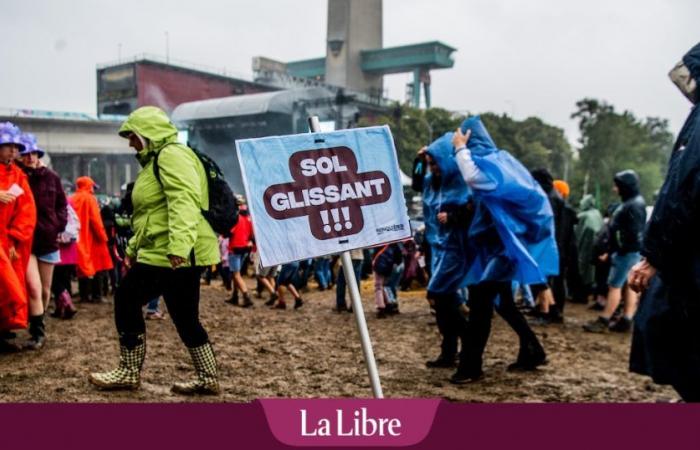A sky so gray that a festival-goer hanged himself
The weather is the current nightmare for the organizers of the major summer events. We remember, already last summer, the sky had fallen on the heads of some. The Ardentes had to cancel their Sunday day and the Ronquières Festival had experienced a cataclysmic edition in the words of the organizers themselves. The specter of reliving such situations is in everyone’s mind, even if on the inclined plane side, we have learned lessons from the chaos. “The situation suggests a very complicated season. Our luck is that we are coming out of a 2023 edition which forced us to take structural measures which have been considered throughout the last few months, whether in terms of parking, insurance, the mobility plan, management of the site, etc.”explains Jean-François Guillin, member of the organizing team.
But the weather doesn’t only have consequences during festivals. It also has an impact on ticket pre-sales. A significant impact. For months now, the sky has been looking gray and crying. Consequence: potential festival-goers hesitate to buy their tickets. Hence cash flow problems for events which must advance sums, whether to partially pay the artists’ fees or their suppliers.
The situation is such that in France, we are seeing discounts of up to 40% on Ticketmaster for certain festivals. Less 24% for Les Eurockéennes!
Part of the Graspop festival campsite evacuated due to bad weather
Fees and production costs are soaring
Cash flow is the organizers’ other nightmare. It becomes a headache, even more so when the weather gets involved. It’s no secret: artists’ fees have exploded in recent years. It started before Covid, but the trend has accelerated since then. Between 10 and 30% increase, the organizers of the Ronquières Festival tell us. “Most artists were available just after the health crisis with the advantage that festivals were not competing for headliners as is the case today. Artists take advantage of the festival season to increase the number of dates, because concerts have become their main source of income, Gino Innocent explained. Large festivals may demand exclusives and, to obtain them, are willing to make bids to win the bid. Consequence: all fees are on the rise, without exception.”
According to an investigation by Parisian published last year, it is no longer rare to have to pay a million euros for an international star, something which was still the exception ten years ago.
In France, a case caused a lot of noise, that of Greenland Festival in the Pyrénées-Orientales. Several artists including Ninho and Hoshi announced at the end of May that they were withdrawing from the poster for non-compliance with the contract signed with the organizers. The latter had even called it a scam because they had not received the advance on the negotiated fee. The organizers responded virulently by denouncing fees that were far too high and unreasonable additional requirements.
Ultimately, the event was canceled.
The big names are not the only ones to skyrocket their fees. “Festivals have also become calling cards for emerging artists. They perform with settings or technical means hitherto required by important artists. All of this comes at a cost which adds to the festival budget. To get an idea of the inflation of fees, the price of a headliner in 2012 is worth today for an artist who performs late in the afternoon”adds Jean-François Guillin.
Desperately looking for headliner
The Baud’estival is paying the price for exclusives – at least partly – this year. For its eleventh edition, it offered Bigiflo and Oli as headliners on Sunday. But on Saturday, the box is always empty. A mystery artist is announced without further details. Contacted, Mathieu Rossignol, the mayor of Bertrix and boss of the event, explained how much trouble he had to find this headliner. Discussions took place with at least one big name but they did not come to fruition after several weeks of waiting. Consequence: ticket sales for the day on Saturday did not live up to expectations, with an impact also on sales of 3-day passes.
Mathieu Rossignol, however, wants to be confident, even if he recognizes that the situation is not the most comfortable. He should announce the headliner for the Saturday of his Baud’estival in the coming days, as well as two additional names. Sunday sales being ahead of forecasts, he remains calm.
A painful shortage
A painful one further weighed down by a consequence of the pandemic. “It is undoubtedly among technical service providers that the increase in costs is the most significant. Some of our suppliers charge prices 20 to 40% more expensive than in previous yearsconfides Jean-François Guillin. During Covid, a whole series of people working in this sector reoriented themselves. Today there is a shortage of qualified personnel and those who are able to offer these services have understood this and are signing with the highest bidders with take-it-or-leave-it prices.”
This is all the more true as this summer is very busy with various events. Because festivals don’t just face competition between themselves. We think of the Euro in Germany, the Olympic Games in Paris, etc. “The shortage of qualified personnel or equipment is felt everywhere. And this increase has a strong impact on events, especially since we cannot indefinitely pass on this increase in costs to the public.”, points out Gino Innocente. If in the United States as in England, it is now normal to pay 400 to 600 euros for three days of festival – base price –, such a situation is inconceivable here. “In Wallonia, no one is ready to pay these prices. Some festivals, like in France, have more or less significant subsidies to cushion this surge in costs. But this is not the case with Ronquières.”
In Brussels, competition between festivals raises eyebrows and causes concern
Fill or Die
”Until now, we had to have a minimum 80% occupancy to achieve our financial balance. This year, it will probably be necessary to reach 90% to avoid losing money as we have made the decision, in a context of tight purchasing power, not to increase the price of our tickets and, better still, to reduce our gauge to guarantee the comfort of spectators and maintain this family atmosphere that our audience expects”, concedes Jean-François Guillin.
Esperanzah! known. The festival located in Floreffe has launched an SOS. On his site, he asks for help from his followers. Last year, its accounts plunged into the red. 300,000 euros deficit! “The call for citizen capital is our lifeline”indicate the organizers who invite festival-goers to become co-owners of the event by purchasing shares put on sale at 100 or 1,000 euros.
“There are perhaps too many festivals in Belgium”
To explain this situation, Esperanzah! advances the financing problems, but also the difficulty of standing out in terms of the proposed poster. “There is real competition between festivals”, recognized Arnaud de Brye, the coordinator. Hence the need to change strategy with a return to basics: one big scene, but more small ones. That is to say lower fees but also less prestigious names…
Aren’t there also too many festivals in Belgium? There are more than 400 per year. “We will take stock at the end of this edition and we will have to rationally analyze the evolution of the market, because the business model is becoming more and more tense and fragile. Since the health crisis, the sector as a whole has changed. So, yes, to be very honest, I think there are perhaps too many festivals in Belgium”concedes Jean-François Guillin.
Belgium, hub of festivals: a thriving business, but also increasingly risky (VIDEO)
Lots of competition
Competition doesn’t just come from festivals. A new phenomenon: the big names now perform themselves, without going through festivals. We think of Coldplay, Rammstein (who performed last year while the Ronquières Festival was taking place) or Beyoncé who have visited us in recent summers. Since fans’ wallets are not expandable as desired, we sometimes – often… – have to choose and therefore give up, with festivals paying the price.
Another point to take into consideration: some artists tour a lot. “Having scoured the venues in Belgium before the summer, they obviously lost their appeal at festivals. Anyone who has filled Forest National several times or who has performed in several venues in Wallonia will have more difficulty mobilizing audiences at festivals. This is unfortunately a parameter that artists or their representatives do not want to understand. The equation is however simple: less attractiveness for ever more expensive fees. The situation is becoming difficult to maintain for small or medium-sized festivals,” analyzes Jean-François Guillin.
The war in Gaza, politics, the environment…
Let’s add one more piece of data to this. This week, the Download Festival, a British event, was faced with the withdrawal of some of the artists from its poster. Reason: the presence of the Barclays bank as sponsor of the event. Not acceptable to certain groups who believe that this banking institution supports Israel in the war being waged in the Gaza Strip. Since then, the bank in question has withdrawn its sponsorship and with it that of the Isle of Wight festival.
One more threat weighing on festivals, even if it is not new. No one is safe, say the organizers of the Ronquières Festival. They take the example of Shaka Ponk, a group very committed to the environmental cause. What would have happened if Total had been a sponsor of the Hennuyer event when they are on show this year?
In another register, we also remember Indochina and Louis Attaque who questioned, last year, their participation in the Déferlantes, a festival in the Pyrénées-Orientales, when there was talk of moving the event to Perpignan, municipality led by the National Rally (formerly National Front).
The Les Déferlantes festival renounces Perpignan, boycotted by Indochine and Louise Attaque






